We test and review fitness products based on an independent, multi-point methodology. If you use our links to purchase something, we may earn a commission. Read our disclosures.
Protein is often called the “king of macronutrients” for its role in hypertrophy, the muscle-building process, and its ability to help muscle tissue recover after workouts. Dietary proteins have many more essential functions than that, but among fitness fiends, muscle growth is the primary reason for consuming more protein.
But you may be wondering, “How much protein do I need?” and luckily, the answer is pretty simple, unlike the answers to many other fitness questions. Ahead, learn about the daily protein requirements for adults and whether that lines up with the amount needed for optimal athletic performance.
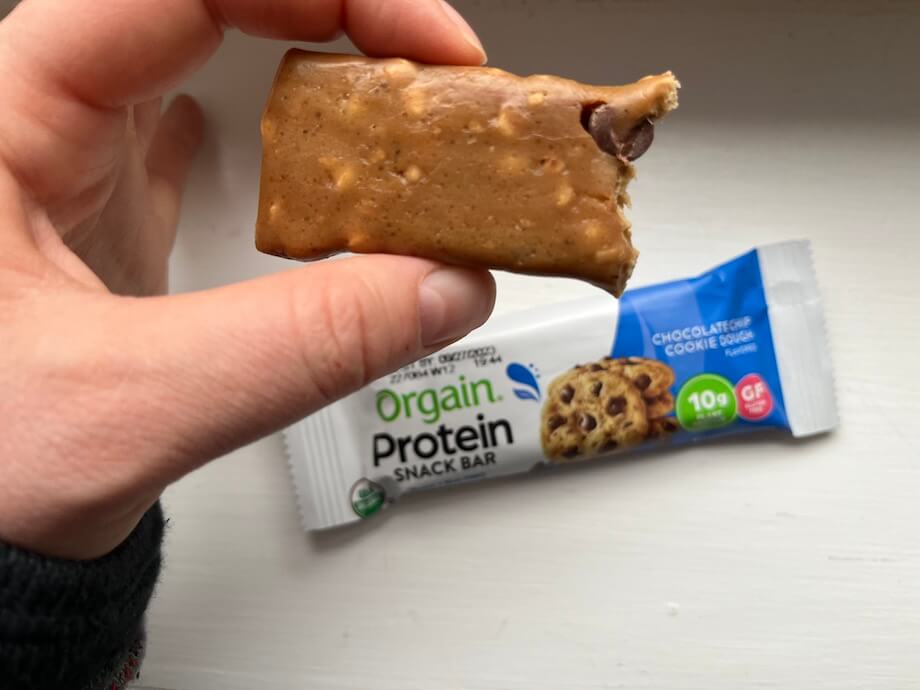
RELATED: Best Protein Bars
Medical disclaimer: This article is intended for educational and informational purposes only. It is not intended as a substitute for medical advice. For health advice, contact a licensed healthcare provider.
What Is Protein and Why Is It Important?
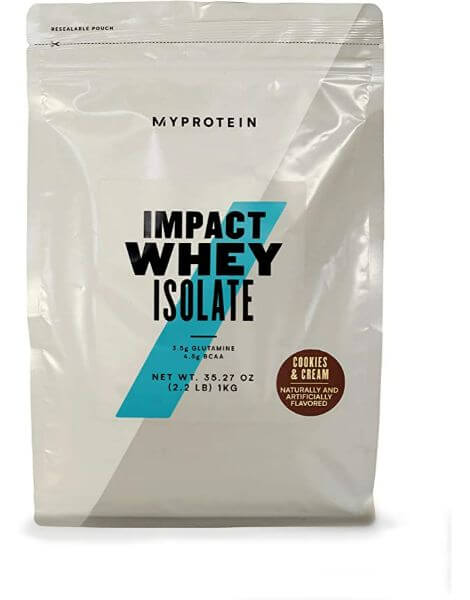
Protein is one of three macronutrients (the other two are carbohydrates and dietary fats) and, as registered dietitian and GGR writer Sydney Lappe sums up in our guide to high-protein foods, “Protein is found in muscle, hair, bone, and just about every body structure. Protein also is necessary to carry out virtually all biological and chemical reactions within the body, including life-saving roles like blood clotting and wound healing.”
Proteins work as messengers, enzymes, hormones, antibodies, transportation agents, chemical catalysts, structural supports, and, yes, the very idiomatic (but accurate) building blocks, according to a book from StatPearls publishing, indexed by the National Library of Medicine1.
So, yeah, it’s quite important—and not just for the better-known reason of increasing muscle mass. Consuming plenty of protein-rich foods (and/or high-quality protein supplements) is ultra-important for your overall health. Your body needs protein to perform countless physiological functions within the body.
How Much Protein Should You Really Eat?
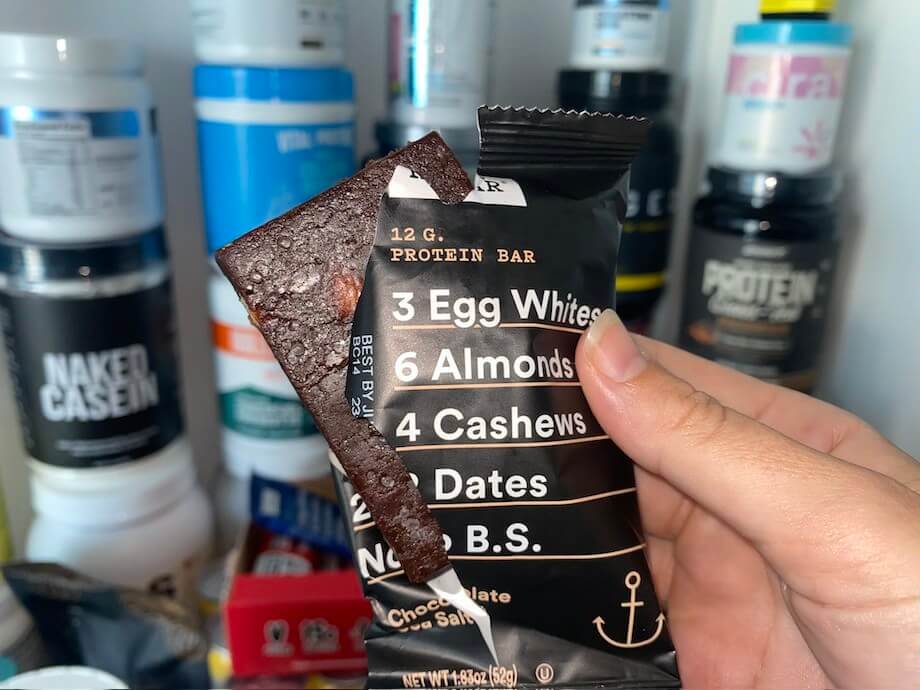
The recommended dietary allowance (RDA) set forth by the USDA and U.S. Department of Health and Human Services (USHHS) for protein is 0.8 grams of protein per kilogram of body weight per day for adults (g/kg/d)2.
RELATED: Best Protein Powder
An RDA3 is the amount of protein a human body needs to support basic physiological processes—in other words, to remain healthy assuming you don’t have preexisting conditions that require more or less of a specific nutrient.
Many reputable nutrition and fitness organizations—the Academy of Nutrition and Dietetics, American College of Sports Medicine, and International Society for Sports Nutrition, to name a few—recommend that adults consume 1.2 to 2.0 g/kg/d to support muscle recovery and performance4.
Sure enough, some researchers have suggested that a target of 1.2 to 1.6 g/kg/d is more ideal than the RDA Of 0.8.5
RELATED: Best protein powder for men
(P.S.: You can find RDAs and other values for all nutrients within the National Institutes of Health Office of Dietary Supplements2.)
Another way to look at this is by assigning a percentage of your daily calories to protein. According to the 2020-2025 Dietary Guidelines for Americans, developed by the USDA and USHSS, adults should aim for 10 to 35 percent of their calories to be from protein.
If you eat 2,000 calories per day, that would look like:
- 200 calories from protein on the low end, which is 50 grams of protein (there are four calories per gram of protein, so divide 200 by 4)
- 700 calories from protein on the (very) high end, or 175 grams (700 divided by 4)
RELATED: Best protein powder for women
Factors That Affect Protein Needs
Other than your body weight, a few other factors affect how much protein you should consume in your day-to-day life.
Those factors include gender, age, and physiological states, which are things like pregnancy, disease, injury, and physical fitness.
RELATED: Best-tasting protein powder
For example, elite athletes benefit from more protein to support athletic performance and muscle recovery3; older adults benefit from more protein to combat sarcopenia6, or age-related muscle loss.
How to Calculate Protein Needs
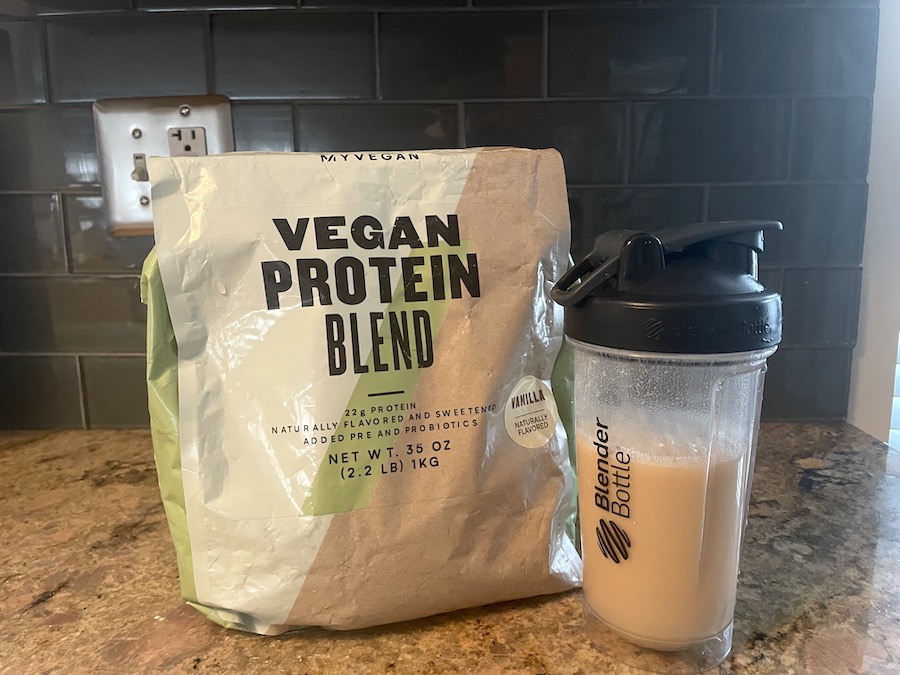
If you’re struggling to eat enough protein, the first thing you can do to start your “eat more protein” journey is accurately track how much of the macronutrient you’re currently eating, and then calculate your protein needs.
RELATED: Best organic protein powder
The equation is simple. Assuming you’re reading this from the U.S., first convert your bodyweight in pounds to kilograms. To do so, divide your weight by 2.2.
Example: 140 pounds divided by 2.2 equals about 63.3 kilograms.
Then multiply your weight in kilograms by the RDA of 0.8.
Example: 63.3 kilograms multiplied by 0.8 equals 50.64.
So, a 140-pound person should eat about 50 grams of protein per day for physiological functions to remain homeostatic and in good working condition. This is how much you need to keep your engines running without needing repair.
If you aren’t currently meeting the RDA for protein, that’s a great initial goal.
If you do already meet the RDA, you can play around with the equation—for example, multiplying your weight in kilos by 1, 1.2, 1.5, and so forth—to determine a higher but attainable goal.
Can You Really Eat Too Much Protein?
Yes, you can. This may come as a surprise—and a disappointment—to some bodybuilders out there, but as with all things in life, too much of a good thing can be a bad thing (*ahem* overtraining).
So how much protein is too much?
It’s quite difficult for the average person to eat too much of the “king nutrient,” but it can happen. According to the Mayo Clinic7, “Excessive protein intake would be more than 2 grams per kilogram of body weight each day.”
For a 150-pound (68-kilogram) person, 2 grams of protein per kilogram of body weight per day (g/kg/d) equates to 136 grams.
Harvard Health Publishing8 cites these same numbers and says that consuming 2 or fewer grams of protein per kilogram of body weight “seems like a reasonable recommendation” until experts unveil more conclusive evidence that indicates otherwise.
Conflicting evidence on this topic abounds, with some studies9 finding no adverse effects of very high-protein diets and others finding implications of vascular, renal, and digestive problems10.
Additionally, there’s not much evidence to suggest that people (even those with a high activity level) experience further benefits from consuming more than 2 grams per kilogram of body weight per day.
One 2014 study in the Journal of the International Society of Sports Nutrition11 found that consuming a very high-protein diet of 4.4 g/kg/d resulted in no significant positive changes compared to the control group. The authors conclude that “Consuming 5.5 times the recommended daily allowance of protein has no effect on body composition in resistance-trained individuals who otherwise maintain the same training regimen.”
Yet, a year later, the same journal published a study12 concluding that a high-protein diet of 3.4 g/kg/d in conjunction with resistance training may, in fact, provide benefits greater than a lower-protein (but still adequate) diet.
RELATED: Best protein chips
What Happens If You Eat Too Much Protein?
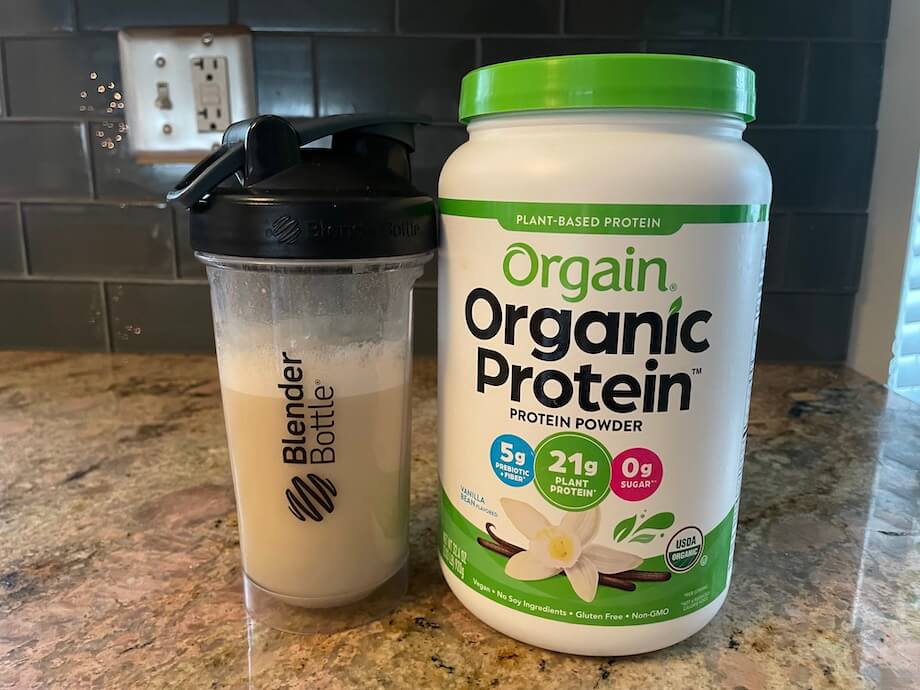
Although evidence is inconclusive, some research has suggested that overconsumption of protein can lead to health problems related to the kidneys, the cardiovascular system, the skeleton, and the digestive system.
According to an analysis of studies in the journal ISRN Nutrition13, high protein intake has been associated with an increased risk of kidney stones and high acidic profiles in the kidneys; negative calcium balance and increased risk for bone loss; and progression of coronary artery disease, a form of heart disease. However, the latter is also associated with a high-meat diet, not just a high-protein diet, and intake of saturated fat and cholesterol should be considered.
The study in ISRN Nutrition also claims that overconsumption of protein is linked to an elevated cancer risk of multiple types, but again, the studies cited looked at meat and red meat intake, not just protein intake.
And to be clear, high protein intake is not overtly associated with the development of chronic kidney disease (CKD)14, but individuals with this condition should speak to a registered dietitian nutritionist and other healthcare professionals about protein intake higher than the RDA.
I provide this information not to discourage people from eating more protein, but to remind people not to overlook the possible detrimental effects of a nutrient so often dubbed “king.”
Fitness enthusiasts tend to get tunnel vision and, as the authors of the ISRN Nutrition study13 state, “Guidelines for diet should adhere closely to what has been clinically proven.”
This is to say, you should really only eat a higher amount of protein if you don’t currently consume enough to support your body in pursuit of your goals, whether that means the minimum RDA or the upper level of 2 g/kg/d.
RELATED: Best whey protein
Final Thoughts: How Much Protein Do I Need?
Protein needs vary depending on your body weight, activity level, and goals. Someone who weighs 200 pounds, lifts weights five days per week, and wants to gain muscle, will need much more protein than someone who weighs 120 pounds, moderately exercises three days a week, and just wants to stay healthy.
- The RDA for protein is 0.8 grams of protein per kilogram of body weight. This is how much you need to meet basic nutritional requirements, AKA, keep your body’s systems humming along smoothly.
- The maximum recommended intake is 2 grams of protein per kilogram of body weight. This is considered the tolerable upper limit for human consumption, meaning that beyond this amount, there is potential for health detriment.
Q&A: How Much Protein Do I Need?
What are some healthy sources of protein?
The best sources of protein (strictly from a protein-per-calories standpoint) include animal protein, such as chicken breast, beef, and pork, as well as fish (which are also great sources of omega-3s). Lean meats tend to provide more protein with fewer calories since they don’t contain as many fats.
Plant-based protein sources include lentils, legumes, beans, nuts, and seeds. Even some foods that are higher in carbs, like quinoa and other whole grains, contain dietary protein. Dairy sources include greek yogurt, kefir, whole milk, and cheeses. Additionally, protein powder, whether whey, casein, or plant-based, can be a helpful tool to increase daily protein intake.
Are amino acids the same as protein?
No, amino acids aren’t the same as protein, although amino acids are the “building blocks” proteins. There are 20 amino acids necessary for human life and function, with nine of those being essential amino acids (EAAs). Our bodies don’t produce EAAs on their own, so we must consume them via food15. As you might guess, most amino acids are found in protein-rich foods.
Is 100g of protein per day enough?
According to the U.S. dietary guidelines, specifically the RDA for protein, 100 grams of protein per day is enough for most people to avoid negative health effects.
Does eating more protein help with weight loss?
Studies have shown increased protein intake to help with satiety, or the feeling of being full, as stated in a review of studies in the Journal of Obesity and Metabolic Syndrome16. By eating the best protein powder for weight loss, you may inadvertently decrease your calorie intake, thereby putting you in a caloric deficit and helping you reduce body mass over time.
What will happen if I increase my protein intake?
Lots of things can happen when you increase your protein intake. For one, it’s a good way to build muscle and combat muscle loss, especially for older adults or people who are recovering from an injury. Additionally, some evidence16 suggests that eating more protein can help people lose body fat and maintain a healthy weight. Proteins are important for the health of your skin, hair, and nails, so after some time, you may notice improvements there, too. Eating more protein may also help with hormone balance and nerve function.
These statements have not been evaluated by the Food and Drug Administration. This product is not intended to diagnose, treat, cure, or prevent any diseases.
References
- LaPelusa A, Kaushik R. Physiology, Proteins. [Updated 2022 Nov 14]. In: StatPearls [Internet]. Treasure Island (FL): StatPearls Publishing; 2022 Jan-. Available from: https://www.ncbi.nlm.nih.gov/books/NBK555990/
- Hudson JL, Wang Y, Bergia Iii RE, Campbell WW. Protein Intake Greater than the RDA Differentially Influences Whole-Body Lean Mass Responses to Purposeful Catabolic and Anabolic Stressors: A Systematic Review and Meta-analysis. Adv Nutr. 2020;11(3):548-558. doi:10.1093/advances/nmz106
- U.S. Department of Health and Human Services, National Institutes of Health, Office of Dietary Supplements. Nutrient Recommendations and Databases.
- Carbone JW, Pasiakos SM. Dietary Protein and Muscle Mass: Translating Science to Application and Health Benefit. Nutrients. 2019;11(5):1136. Published 2019 May 22. doi:10.3390/nu11051136
- Phillips SM, Chevalier S, Leidy HJ. Protein “requirements” beyond the RDA: implications for optimizing health [published correction appears in Appl Physiol Nutr Metab. 2022 May;47(5):615]. Appl Physiol Nutr Metab. 2016;41(5):565-572. doi:10.1139/apnm-2015-0550
- Lonnie M, Hooker E, Brunstrom JM, et al. Protein for Life: Review of Optimal Protein Intake, Sustainable Dietary Sources and the Effect on Appetite in Ageing Adults. Nutrients. 2018;10(3):360. Published 2018 Mar 16. doi:10.3390/nu10030360
- Mayo Clinic Health System. Are You Getting Too Much Protein? 2022;4(19).
- Harvard Health Publishing. When it comes to protein, how much is too much? 2020;3(30)
- Antonio J, Ellerbroek A, Silver T, et al. A High Protein Diet Has No Harmful Effects: A One-Year Crossover Study in Resistance-Trained Males. J Nutr Metab. 2016;2016:9104792. doi:10.1155/2016/9104792
- Wu G. Dietary protein intake and human health. Food Funct. 2016;7(3):1251-1265. doi:10.1039/c5fo01530h
- Antonio, J., Peacock, C.A., Ellerbroek, A. et al. The effects of consuming a high protein diet (4.4 g/kg/d) on body composition in resistance-trained individuals. J Int Soc Sports Nutr 11, 19 (2014). https://doi.org/10.1186/1550-2783-11-19
- Antonio J, Ellerbroek A, Silver T, et al. A high protein diet (3.4 g/kg/d) combined with a heavy resistance training program improves body composition in healthy trained men and women–a follow-up investigation. J Int Soc Sports Nutr. 2015;12:39. Published 2015 Oct 20. doi:10.1186/s12970-015-0100-0
- Delimaris I. Adverse Effects Associated with Protein Intake above the Recommended Dietary Allowance for Adults. ISRN Nutr. 2013;2013:126929. Published 2013 Jul 18. doi:10.5402/2013/126929
- Ko GJ, Obi Y, Tortorici AR, Kalantar-Zadeh K. Dietary protein intake and chronic kidney disease. Curr Opin Clin Nutr Metab Care. 2017;20(1):77-85. doi:10.1097/MCO.0000000000000342
- Church DD, Hirsch KR, Park S, et al. Essential Amino Acids and Protein Synthesis: Insights into Maximizing the Muscle and Whole-Body Response to Feeding. Nutrients. 2020;12(12):3717. Published 2020 Dec 2. doi:10.3390/nu12123717
- Moon J, Koh G. Clinical Evidence and Mechanisms of High-Protein Diet-Induced Weight Loss. J Obes Metab Syndr. 2020;29(3):166-173. doi:10.7570/jomes20028
Further reading

Pump up your chest and add muscle and strength with our expert-vetted cable crossover exercise tips. Read more

Our team of expert product testers has personally used the best ellipticals under $1,000 to give you our expert, unbiased opinion on which might be best for you. Read more

Find out if this discontinued cardio machine is right for you with our NordicTrack AudioStrider 990 Elliptical Review. Read more

The EnergyFit SKI-ROW is a combination of both a rowing and skiing machine in one (semi) compact unit. The biggest consideration should be how it compares to the Concept 2 Model D Rower and Concept 2 SkiErg and after comparing the two, Concept 2’s machines are vastly superior. Although we like the novel idea of the SKI-ROW, we do think there are some issues that need to be addressed before we can fully recommend it. Read more

